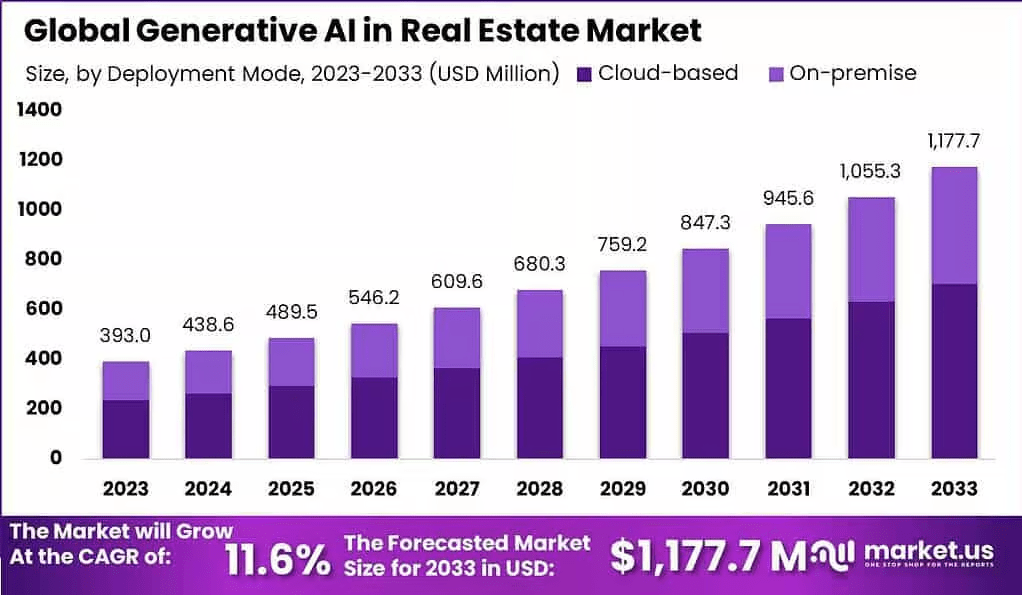Introduction
The Generative AI in Real Estate Market is redefining how properties are designed, marketed, valued, and managed by introducing intelligent automation and content creation across the real estate lifecycle. From generating personalized property listings and virtual staging to automating investment analysis and architectural design, generative AI is streamlining processes and enhancing decision-making for agents, developers, and buyers alike. As the sector shifts toward digital transformation, generative AI tools are emerging as powerful enablers of efficiency, creativity, and scalability in a traditionally conservative and paperwork-heavy industry.

Key Takeaways
Generative AI is revolutionizing real estate by automating content creation, predictive modeling, and client engagement. It enables faster listing generation, more accurate property valuation, tailored marketing campaigns, and immersive experiences through AI-generated visuals and descriptions. Key drivers include the demand for virtual property tours, the rise of AI chatbots for customer support, and growing investor interest in data-driven real estate strategies. The market is witnessing adoption across residential, commercial, and industrial segments, with proptech startups and tech-savvy brokerages leading the charge. Ethical AI use, data transparency, and accuracy in generated content are becoming top concerns.
Component Analysis
Key components of generative AI in real estate include natural language generation (NLG) platforms, computer vision tools, 3D modeling and rendering engines, predictive analytics models, and chatbot frameworks. NLG creates compelling property descriptions from structured data, while computer vision supports AI-based image enhancement, virtual staging, and architectural design. 3D rendering tools powered by AI enable lifelike virtual tours and simulations. Predictive models help in investment forecasting and demand estimation. These components are often integrated into CRM systems, property management software, and listing platforms to deliver intelligent and automated workflows.
Service Analysis
Services driven by generative AI in real estate include automated listing and content generation, AI-powered lead qualification, property valuation and forecasting, virtual staging and tour design, and personalized marketing automation. Agents and platforms use AI tools to instantly generate property ads, match listings with buyer preferences, and simulate design changes for under-construction projects. Investors benefit from AI-assisted portfolio management and ROI prediction. Additionally, marketing agencies are using generative AI to craft hyper-targeted campaigns and email sequences, while SaaS providers offer integration and support services to ensure seamless AI deployment across real estate ecosystems.
Key Player Analysis
Key players in this space include Zillow, Redfin, Matterport, OpenAI (via integrations), Canva (for AI visual content), REimagineHome, Houzen, and Restb.ai. Zillow and Redfin are enhancing listings with AI-generated descriptions and pricing insights. Matterport uses AI for 3D tours and immersive property visualization. Startups like REimagineHome and Houzen are focusing on generative AI for home redesigns, staging, and investment intelligence. Restb.ai specializes in AI-based image recognition and visual content tagging for real estate platforms. OpenAI’s models are increasingly integrated into CRM and marketing solutions for lead engagement and content automation, signaling the market’s strong growth potential.
Top Market Leaders
- Opendoor Labs Inc.
- Zillow Group Inc.
- Trulia LLC
- Redfin Corporation
- Compass Inc.
- Realtor.com
- Remine Inc.
- Roof Ai
- SmartZip Analytics Inc.
- Apartment List Inc.
Conclusion
Generative AI is unlocking new efficiencies and creative possibilities in real estate, turning traditional processes into intelligent, data-driven experiences. As property firms, brokers, and investors embrace this transformation, the market will continue to evolve with smarter listings, faster sales cycles, and more personalized customer journeys. With the right balance of innovation and ethical use, generative AI is poised to become a cornerstone of the next-generation real estate ecosystem.
The macro analyst desk brings highly sought after financial news based on market analysis, insider news and company filings.
